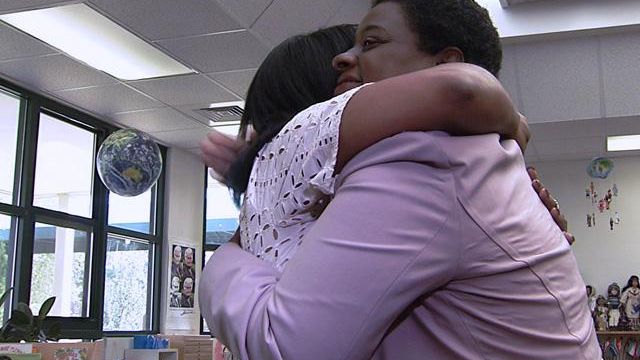Local News
Kidney donation connects friends forever
Wake County District Judge Lori Christian has quietly faced a private battle that threatened to rob her of the life she had built for herself and her family.
Posted — UpdatedRALEIGH, N.C. — In the courtroom, Wake County District Judge Lori Christian says she is at her best.
The 47-year-old mother of two, appointed last year by Gov. Mike Easley, was elected last week to the District 10 seat, where she presides over domestic violence court, criminal court and child support enforcement court.
"I love my job. If I never have another job in my life, I will feel like I'm blessed," Christian said. "I love being a judge."
But while her professional life was at its pinnacle – she changed careers in the early 1990s from industrial engineering to law, served in the Wake County Attorney's Office handling abuse and neglect cases and helped create the county's first drug-treatment court – a degenerative kidney disease was quietly killing her.
In 2002, doctors diagnosed Christian with focal segmental glomerulosclerosis, which affects how the human body processes toxins and can lead to kidney failure.
Six years after her diagnosis, she says, she became so tired she could barely function outside her job. In January, the illness forced her to go on dialysis. Her doctor, however, said the treatment would not be enough.
"He said, 'You either have to have a transplant or you have to live on dialysis – and you're too young and too healthy to live on dialysis,'" she said. "'You want to have a transplant. That's going to give you the optimum life.'"
Marie Molin, a kindergarten teacher who taught Christian's son eight years ago at the Sterling Montessori Academy and Charter School, knew her friend's health was deteriorating.
"I preach it to my children in my class all day long: 'Take care of your friends, be nice to your friends,' so I needed to do the same – practice what I preach," Molin said.
The single mother decided this past summer it was time to offer her friend – someone she considers family– one of her kidneys.
Christian was uncomfortable at the thought of having Molin tested to see if she might be a match, but Molin insisted.
"It is the ultimate selfless act, and I guess Marie is the ultimate selfless person," Christian said. "She's giving me back my life, and what do you say to somebody that's giving you your life?"
The surgery was scheduled at Duke University Hospital in October. In less than five hours, Christian had a new kidney.
For Christian, there is now a new normal – life without dialysis, life with new possibilities.
"It's unbelievable," she said. "I still pinch myself and say, 'Wow, is this for real?'"
Now recovering from surgery, Christian is now recovering from surgery at home and hopes to be cleared to go back to work in December. Molin visits almost every day.
"I didn't do anything. She did all of the work," Christian said. "She is the real hero. For that, I'm grateful. I'm proud, and I'm proud to have her as my friend."
Both women say they feel compelled to spread the word about organ donation, especially in the black community.
"It's just an incredible gift that you can never say enough thank yous," Christian said. "I hope that I never forget that it was an incredible gift and that I've got to pay it forward."
More than 3,000 people are on the waiting list for organs in North Carolina – about 2,300 need kidneys. Last year, nearly 200 people died while waiting for a transplant.
• Credits
Copyright 2024 by Capitol Broadcasting Company. All rights reserved. This material may not be published, broadcast, rewritten or redistributed.






